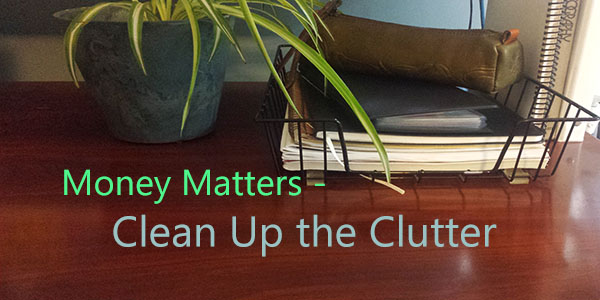Money Matters: Clean Up the Clutter
Cary, NC — Are your cabinets cluttered with old financial documents? Nick Putnam, a Financial Advisor for First Command Financial Services, Inc. helps us decode which are okay to toss.
Clean Up the Clutter
If piles of financial documents have taken over your home, it’s time to clean up the clutter.
Taking time to file and throw away financial papers may seem like an overwhelming task, but once you’ve set up a working system, it’s just a matter of keeping on top of new documents as they come in. Here are a few ways to clean your financial house.
Get Organized
Sort through the piles and arrange documents into groups. For example, put all your tax records into one group and credit card statements into another. Throw out any documents you no longer need. It’s a good idea to shred the documents that you decide to discard.
Once you get organized, set up a simple filing system. Then, when you receive a financial document, decide right away whether to file it or discard it.
If you don’t let the documents pile up, you’ll be able to stay on top of the clutter.
What to Toss
- Utility bills once you’ve paid them.
- Credit card statements that you have verified as accurate and have paid. (You will probably want to hang on to statements that you may need for warranty, insurance, or tax purposes.)
- Bank deposit slips and ATM receipts after the transactions have appeared on your bank statements.
- Quarterly retirement plan or investment account statements once you’ve checked them against the annual summary.
- Pay stubs after you have received and verified your W-2.
What to Keep
- Copies of state and federal tax returns — indefinitely.
- Information you used to prepare your tax return, such as W-2s, 1099s, receipts, and canceled checks — for six years.
- Records of investments, real estate, and other purchases — for six years after the asset or property is sold.
For any papers you decide to keep, consider an inexpensive filing crate or drawers to keep papers easily accessible but out of sight.
For papers that should be kept indefinitely such as tax returns or birth certificates, consider a fire- and water-proof filing container for your home or a safe deposit box at a local bank.
——————————————————————————————————————————-
Story contributed by Nick Putnam, a Financial Advisor for First Command Financial Services, Inc. Photo by Jessica Patrick.




Hi Cynthia! I’m glad you found it helpful! 5-7 years is not a bad rule of thumb to use. Sometimes older returns are needed to reference a sell of property or certain investment contributions and distributions from years prior. Feel free to contact me if you have more questions. Cheers!
This is really helpful! But I was told we didn’t need to save tax returns past 5-7 years. You disagree apparently. Special reasons? Thanks!
This is really helpful! But I was told we didn’t need to save tax returns past 5-7 years. You disagree apparently. Special reasons? Thanks!